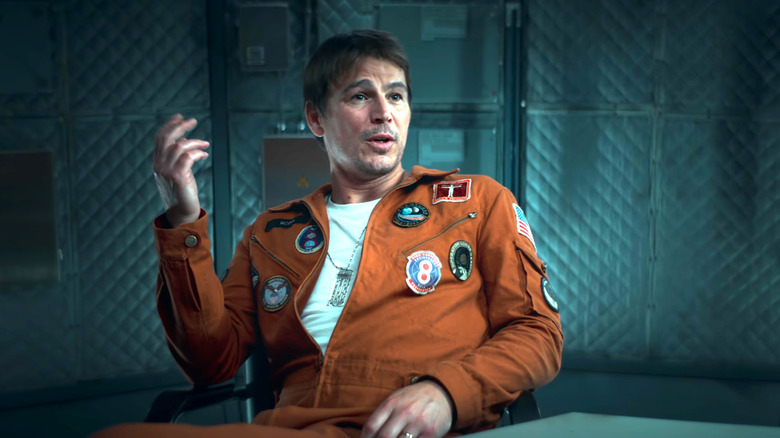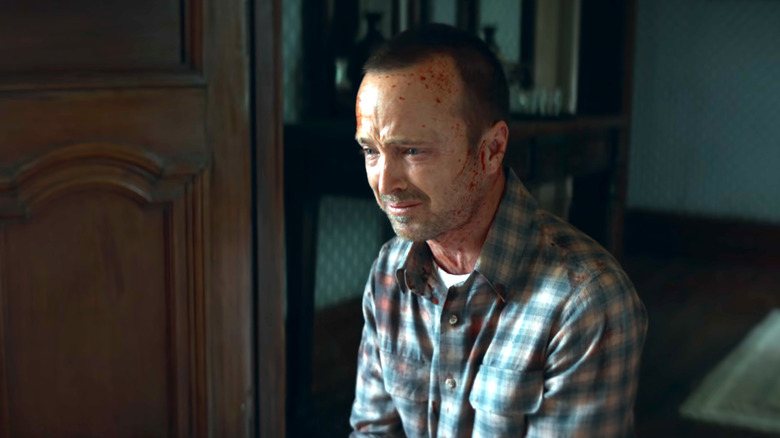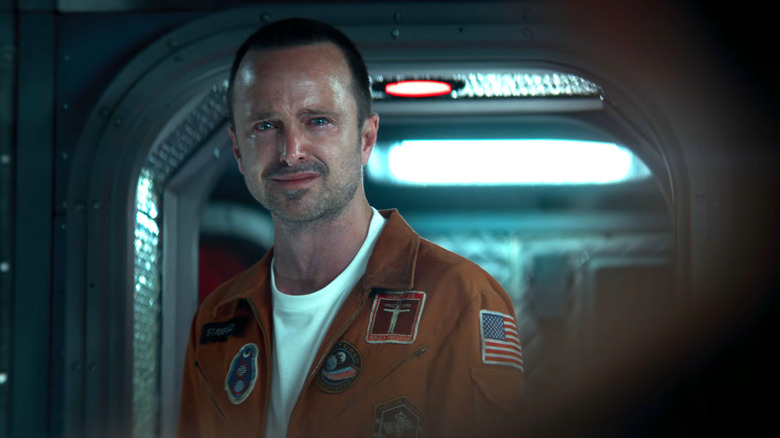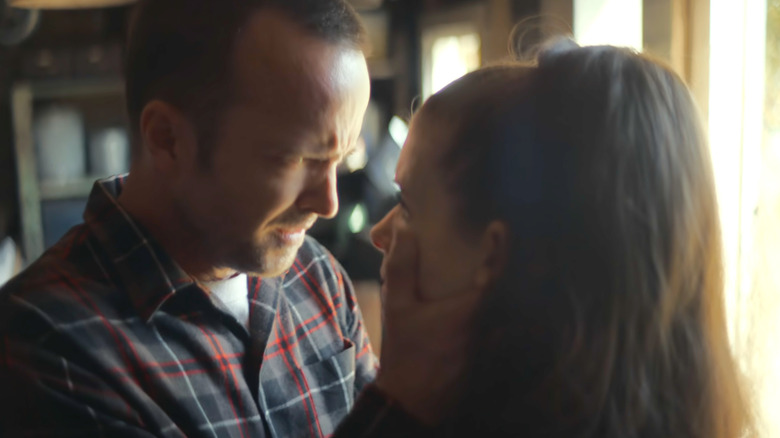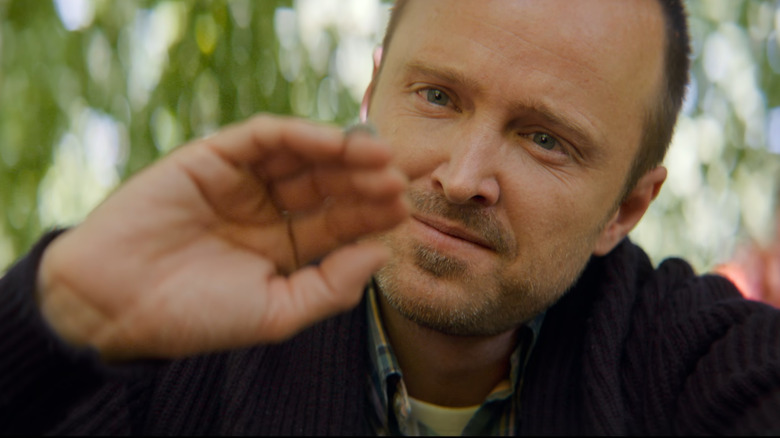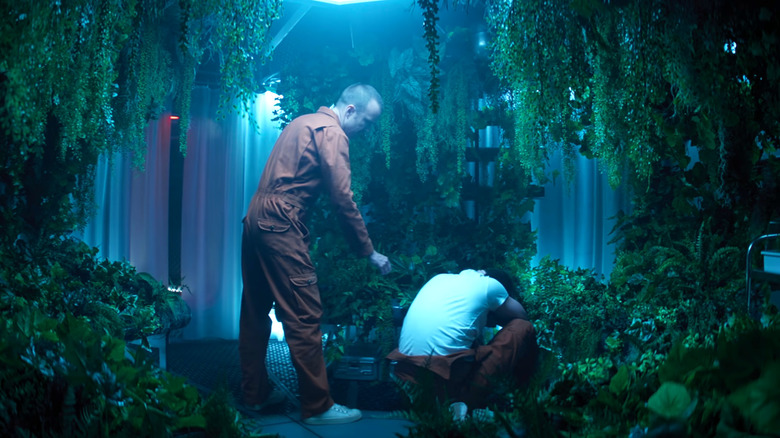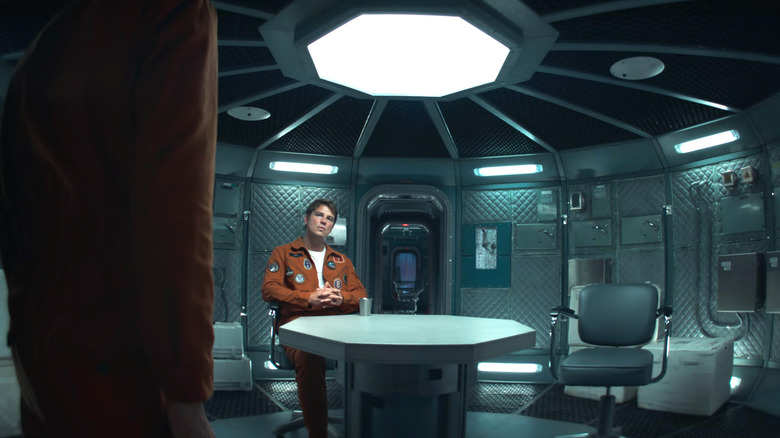Beyond The Sea: Josh Hartnett's Black Mirror Episode, Explained
Season 6 of "Black Mirror" was an odd one. In a TV show that's typically about the not-too-distant future, season 6 brought viewers into the past. "Mazey Day" took place in the mid-2000s, "Loch Henry" in the '90s, and "Demon 79" in the late '70s. "Beyond the Sea" continued the backwards trend by taking place in an alternate version of 1969 – one where NASA's gotten much further ahead in the space race.
The main two astronaut characters, Cliff Stanfield (Aaron Paul) and David Ross (Josh Hartnett), are living half their daily lives in a spaceship hundreds of thousands of miles away from Earth. For the other half of their lives, they use a machine that projects their consciousnesses back to Earth, where they're living inside robot clones (called replicas) that feel the same as their regular bodies.
This setup seems to be working out great, but then one of those dastardly Culkin brothers swoops in to ruin it. In the episode's second darkest scene, a cult leader (played by Rory Culkin) breaks into David's house and murders him and his entire family. David's consciousness survives, being beamed back up into his spaceship, but the rest of his family isn't so lucky. Now David's stuck in a spaceship for years, traumatized by the murder of his family.
Cliff feels bad about the situation, so he lets David use his replica. For a few hours a day, David gets to walk around in Cliff's skin and interact with Cliff's family. But because this is "Black Mirror," the good deed can't go unpunished: David grows too attached to Cliff's wife Lana (Kate Mara), and resents Cliff for not appreciating what he has. After several weeks of growing tension, Cliff cuts David off from his replica. David responds by trapping Cliff outside the spaceship and using Cliff's replica without permission. What does he do with Cliff's replica? He uses it to murder Cliff's wife and child.
David lets Cliff back into the ship, where Cliff uses his replica and sees the bloody aftermath of David's double-homicide. The episode ends with the two angry at each other, but not trying to kill each other just yet. David and Cliff go back to working on the ship, which they'll be stuck on 24/7 for at least another couple years. It's a textbook "Black Mirror" feel-bad ending. But what does it all mean?
Why did David kill Cliff's family?
The big question fans have after watching "Beyond the Sea" is just why the hell David would escalate the situation so severely. The answer to this is a combination of factors: there's the "Shining"-esque cabin fever, the grief over his family clouding his judgment, and the chilling possibility that David was always this vindictive. Before his family's murder, David sure seemed like the kinder, wiser man between himself and Cliff; now we're left to wonder if he was only kind because his life was breezy. Which David is the "true" David: the guy we met at the start of the story or the guy we meet at the end? It's impossible to say for sure.
But the most compelling answer for David's actions is the simple saying: misery loves company. If David had merely lost his family, that'd have been one thing. But it was an extra twist in the knife to have to constantly watch Cliff spend half his days hanging out with his own lovely family. How dare Cliff be happy while David's miserable? It's the same logic behind why Ted from "Scrubs" likes to throw rocks at old couples.
It wasn't just spite driving David; it was that Cliff had given him a taste of freedom and then pulled it away. Cliff letting David use his replica for a few hours a week only made the rest of David's life — stuck inside that spaceship, knowing his wife and kids have been brutally murdered — that much more agonizing. Cliff had valid reasons to cut David off from his replica, but in the end his actions were much crueler than simply never letting David use it at all.
Why doesn't Cliff seek revenge on David?
More confusing for some viewers is not David's sudden murder spree, but Cliff's somewhat blasé reaction to it. While Cliff is horrified and devastated when he sees what's happened, when he returns to the spaceship he's surprisingly collected. The episode ends with the two not at peace exactly, but both seemingly willing to let the whole thing go and get back to work.
The surface-level reason for this is logistical: the ship needs two of them to keep running. If either of them kills the other, neither of them will ever make it back home. This is a part of the premise that chafes at some of the more nitpicky viewers (why would there not be a third crew member on board as backup?!), but honestly it's best not to think about that. Nor should you worry about why they wouldn't build a back-up replica for poor David; they didn't build it because it would kill the plot.
As for the thematic reasons behind Cliff's coolness, it comes down to how the playing field has finally been balanced out. The episode's main tension is that Cliff has something that David doesn't, but now they both have nothing. There are a lot of emotions between these two in the final minutes of "Beyond the Sea," but envy isn't one of them. Cliff's no longer materially above David, and doesn't have to keep up the delicate balancing act of trying not to rub it in his face.
As video essayist Natalie Wynn once noted, envy is unique in that it's a purely destructive emotion. Jealousy can lead to self-improvement, like the student who studies more because they're jealous of a peer's good grades, but envy tends to center on things people can't control. In "Beyond the Sea" there is nothing David could do to improve his situation, but there is something he could to do to worsen Cliff's.
"The basic logic of envy is 'if I can't have it, no one can,'" Wynn noted, "Which is a purely negative, destructive style of thinking. It's taking privileges away not for the material benefit of the underprivileged, but merely for the psychological satisfaction of the envious person." David murdering Cliff's family has helped only in that it's satisfied those envious urges growing inside him. If he feels any guilt for what he's done, it's clear the guilt is preferable to him than what he'd been stewing in before.
'Beyond the Sea' is about how patriarchy is a prison
Missing in the above explanation for the "Beyond the Sea" ending is how any of this might feel from Cliff's wife Lana's perspective, or from their kid Henry's. Enjoying a normal day at home before your apparent husband/father murders you with no explanation is horrifying, but most of the fandom discussion around the ending purely concerns how Cliff himself must feel. "How could David do that to Cliff?" viewers ask, instead of "How could David do that to Lana and Henry?"
The fans' focus on Cliff is a natural extension of the show's depiction of the tragedy — it's shown exclusively from Cliff's perspective, after all. But it's also part of the episode's commentary on the way Cliff sees his family. Cliff postures as the ideal patriarchal figure, but it's clear he sees his family more as his property than as individual people. There's a casual lack of respect Cliff shows towards them throughout the episode, displayed most clearly in the way he insists on them living in an isolated rural home. Lana's clearly not happy here, but Cliff insisted on it, even though she's the one who has to live in this place while he can come and go whenever he pleases. There's a constant, sexist sense of entitlement emitting from Cliff throughout the episode, preventing the audience from ever fully sympathizing with him despite David's increasing transgressions.
"We came here for you," Lana tells Cliff in one of her last moments on screen. "You brought me here, put me in this house. Now I just walk from room to room, and you walk from room to room, but you're a shadow, and I am here. I am real!" Talking about David in Cliff's body, she said, "It felt like my husband was back, and he saw that I'm real, and I want that. And I wished he did to."
The true horror of the episode, however, is the final realization that David doesn't see her as real either. Despite him being characterized as the more sensitive of the two main men, who treated his own wife far more tenderly (and equally, it seemed) while she was alive, David doesn't value her life. As far as David's concerned in the episode's final moments, Lana's just a thing Cliff has that he doesn't. And if he can't have it, no one can.
'Beyond the Sea' may be set in an alternate 1969, but it's really about 2020
Any analysis of "Beyond the Sea" wouldn't be complete without recognizing the time period the episode was produced in. Season 6 was the first "Black Mirror" season written and produced after the onset of the COVID-19 pandemic, and you can definitely see that reflected in the episode's tone. There's no pandemic going on here, but the characters are still in quarantine. Cliff and David are trapped alone on a ship together, and Lana is trapped in a house with just her son and her emotionally neglectful husband.
As a lot of people in real life learned in 2020, sudden prolonged isolation from society can make you feel like you're going crazy. And if you were living with other people when the lockdowns started, your relationship with them was likely tested (or at least complicated) in all sorts of ways. There've been plenty of stories of couples whose minor pre-existing problems were suddenly amplified once they were stuck inside together. It's a messy situation where a person's bad habits grow increasingly noticeable and annoying, but you don't want to push them away because then you'd be completely alone. Cliff and David may not be a couple, but they also experience this agonizing push and pull.
"I don't know if you can tell, but it was written in lockdown," showrunner Charlie Brooker said in a 2023 Q&A, describing the episode as "the ultimate working from home story." He compared the replica technology Cliff and David use as being a metaphor for Zoom, the video chat website that allowed people to hang out digitally, but could still never quite satisfy that human need for connection.
"These [characters] haven't been touched in years but they get this sort of simulated touch," Brooker said. This partly explains why Cliff in particular is so closed off to his wife. It's not just that his attitudes toward women are flawed, but because he doesn't fully feel like he's there with her. He feels like he's hanging out with his wife via Zoom, not hanging out with her for real, and that lack of direct touch strains their already-tense relationship. The only "real" interaction Cliff has is with David, and it's a relationship tainted by grief and envy.
What Josh Hartnett and Aaron Paul think 'Beyond the Sea' is about
Breaking down the episode with The Hollywood Reporter, Hartnett explained how he saw it as a sort of metaphor for how social media breeds envy into otherwise healthy people. As he put it:
"[Charlie Brooker] wrote it during lockdown as a reaction to lockdown. He was feeling isolated and — he probably won't say this — but I think he was feeling a bit of FOMO (laughing) looking at other peoples' lives out in the world. And he thought that maybe you're comparing your own situation to someone else's situation; everybody seems to have their chickens roosting and, why is it always sunny in that part of England and not in my part of England? That's a thing people get into when they're isolated on their social media, and I think this was a reaction to that social media feeling of separation, but being there in a way."
Hartnett also recalled something Brooker had mentioned to him about the episode, paraphrasing, "the idea of love and connection being a resource where if you are completely taken away from it, it will atrophy your soul." This seems like one of the more optimistic reads on David, because it supports the idea that the murderous figure he becomes by the end is not who he always was. Maybe David truly is a good person turned bad, not a bad guy whose true nature was simply revealed.
Aaron Paul hasn't discussed the episode in as much depth, but has still shared some fun insights here and there. In a Radio Times interview, he talked about how he connected to his character. "Look, I read this script on my farm," he said. "I find myself wanting to get away from all kinds of things. I mean, I love the industry and I feel very blessed to be in this industry. But I find peace away from it all." This perspective adds an extra bit of depth to Cliff; we may judge him for forcing his family out into a farm life they didn't want, but in Paul's performance there's still imbued a genuine, almost pure love for the quiet farm life. It's not an inherently bad thing to want; the problem is with how Cliff goes about his life there.
What Charlie Brooker thinks 'Beyond the Sea' is about
In addition to how the themes of isolation, Brooker has talked about what he sees as the true moment of no return for the characters in "Beyond the Sea." After Lana tells Cliff how she's been feeling, there's a moment where Cliff seems to see her as a full person and appreciate what he has. But instead of holding onto her and working to improve their relationship, Cliff responds by going back to the ship and harshly shutting David down. As Brooker put it:
"The tragedy is, just as Cliff learns to reconnect with his wife, he also chooses to rub David's face in it. Cliff chooses to humiliate David. And Cliff is discussing his wife as though she's a possession. It's quite a blow."
Would David had done what he did if Cliff had handled that moment with even a tiny bit more grace? Well, it certainly wouldn't have hurt.
It all serves to bring the episode down to its final chilling moment, where Cliff and David have no choice but to keep working together despite everything's that happened. "I know I'm ready to write an episode if I know what the final image is going to be," Brooker said. "That was in there from the very beginning: a chilling, wordless final image that becomes your North Star — David shoving out a chair for Cliff to sit down." He elaborated:
"Quite often in 'Black Mirror,' stories end up with a trap door opening beneath a character. This is one of the biggest and deepest trap doors we've had. All humanity is lost there. It felt like, "Join me in hell." It's subverting what should be a friendly, simple gesture — come, join me, take a seat — and transforming it into something unbelievably cold. It sent shivers down my spine."
